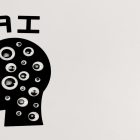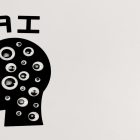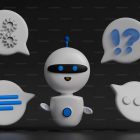How Does Artificial Intelligence Work?

How Does Artificial Intelligence Work – Artificial intelligence (AI) is a rapidly evolving technology that is changing the way we interact with the world. From self-driving cars to virtual personal assistants, AI is changing the game. But how exactly does it work? In this article, we will explore the basics of AI and how it works.
Introduction to Artificial Intelligence
Artificial intelligence refers to the development of computer systems that can perform tasks that would typically require human intelligence. These tasks include natural language processing, image and speech recognition, and decision-making. The goal of AI is to create machines that can learn and think like humans.
Machine Learning
At the core of AI is machine learning, which is a subset of AI. Machine learning involves teaching a computer to learn from data without being explicitly programmed. Machine learning algorithms can improve over time as they are exposed to more data.
Deep Learning
Deep learning is a type of machine learning that involves training artificial neural networks to recognize patterns in data. Neural networks are made up of layers of interconnected nodes, and they can be trained to recognize complex patterns in data.
The Components of Artificial Intelligence
To understand how AI works, it’s important to understand its components. The three main components of AI are:
Data
Data is the fuel that drives AI. Machine learning algorithms are trained on large sets of data, and the quality and quantity of the data can have a significant impact on the performance of the AI system.
Algorithms
Algorithms are the mathematical models that enable AI to learn from data. There are many different types of algorithms used in AI, including decision trees, support vector machines, and deep neural networks.
Computing Power
AI requires significant computing power to process and analyze large sets of data. Advances in computing power have been a key driver of the rapid progress in AI.
Applications of Artificial Intelligence
AI is being used in a wide range of applications, from self-driving cars to personalized medicine. Some of the most exciting applications of AI include:
Self-Driving Cars
Self-driving cars use AI to analyze data from sensors and make decisions about how to navigate the road.
Virtual Personal Assistants
Virtual personal assistants, such as Siri and Alexa, use AI to recognize natural language and respond to user requests.
Predictive Analytics
Predictive analytics uses AI to analyze data and make predictions about future events, such as predicting stock prices or identifying potential health risks.
Challenges and Concerns with AI
While AI has tremendous potential, there are also concerns about its impact on society. Some of the key challenges and concerns with AI include:
Bias
AI systems can be biased if they are trained on biased data or if the algorithms are biased themselves.
Job Displacement
AI has the potential to displace jobs, particularly those that involve routine tasks.
Ethical Concerns
AI raises ethical concerns about privacy, transparency, and accountability.
Conclusion
Artificial intelligence is a rapidly evolving technology that has the potential to transform the world. It is based on machine learning and deep learning, and it requires significant computing power and large sets of data to function. AI is being used in a wide range of applications, from self-driving cars to personalized medicine, but there are also concerns about its impact on society. As AI continues to evolve, it will be important to address these challenges and ensure that AI is used for the benefit of all.
FAQs
What is the difference between AI and machine learning?
AI is a broader field that includes machine learning as a subset.
How is AI used in healthcare?
AI is used in healthcare for personalized medicine, disease diagnosis, and drug discovery.
What is deep learning?
Deep learning is a type of machine learning that involves training artificial neural networks to recognize patterns
How does bias impact AI?
Bias can impact AI if the algorithms are trained on biased data or if the algorithms themselves are biased, leading to discriminatory outcomes.
Is AI going to replace human workers?
While AI has the potential to displace some jobs, it is also creating new job opportunities in areas such as AI development and maintenance.












